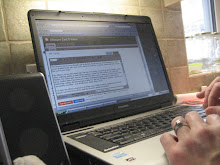I can pinpoint the moment I became a feminist--I was five, and playing doctor with a little boy. When I told him it was my turn ti be the doctor, he told me girls couldn't be doctors. I told him he was wrong--my own doctor was a woman--but he insisted he was right and said my doctor was actually a nurse. It seems small, of course, but I can clearly remember how frustrated I was and also how my own certainty about and freedom in my world was shaken. I worry about that moment happening for my own daughter.
I'd say I think of feminisms, rather than 'feminism'--there are so many different schools of thought that fall under that term. I think of my own feminism as an attempt to find equal space, time and value for women's lives. I think of women's equality as including but going beyond equal opportunities, i.e. the same chance at a job, the same voting rights. Equality would mean creating that space, time and value for the physical and biological reality of a woman's life cycle.
2. What has surprised you most about parenthood?
I've only been mothering for seven weeks. I expected to feel this fierce protectiveness, but it can still be surprising. I'm surprised, too, at what a people magnet a baby is, even in big bad Toronto. i think it's telling, actually; I really do think it takes a village to raise a child, and I've been thinking about ways to invite the village in.
3. What skills have you learned or honed as a parent?
I'd say I think of feminisms, rather than 'feminism'--there are so many different schools of thought that fall under that term. I think of my own feminism as an attempt to find equal space, time and value for women's lives. I think of women's equality as including but going beyond equal opportunities, i.e. the same chance at a job, the same voting rights. Equality would mean creating that space, time and value for the physical and biological reality of a woman's life cycle.
2. What has surprised you most about parenthood?
I've only been mothering for seven weeks. I expected to feel this fierce protectiveness, but it can still be surprising. I'm surprised, too, at what a people magnet a baby is, even in big bad Toronto. i think it's telling, actually; I really do think it takes a village to raise a child, and I've been thinking about ways to invite the village in.
3. What skills have you learned or honed as a parent?
Again, seven weeks in, but I'm learning to type one-handed! And to fold a prefold. And maybe to relax a bit more. But that may be exhaustion.
4. What work do you feel called to do? (You don't need to limit your answer to one thing).
4. What work do you feel called to do? (You don't need to limit your answer to one thing).
Called to, hmm, I don't know that I feel a calling; I have curiosities about things, and I follow those. In the humanities, academics are supposed to feel a calling I think, a hangover from the time we were all monks. But I think there are other ways to be committed to the world.
5. Could you put your identity into a few key words? ie. mother-writer-student. How do you imagine your identity changing in ten years? Or twenty?
5. Could you put your identity into a few key words? ie. mother-writer-student. How do you imagine your identity changing in ten years? Or twenty?
Related to above, I don't really think about myself that way, as a string of nouns--I like instead to think in verbs. They seem more flexible to me, more precise, and less vulnerable to others' assumptions. Maybe I'm totally wrong about that. But at that imaginary cocktail party I'd say I'd say I'm writing a dissertation, and helping to raise a daughter, and doing some freelance editing on the side, which is teaching me a lot about finances. Ten years from now I hope there will be more things about my new community in that list.
6. What is work? What is leisure? Do you have enough time to do the work that you want to do?
6. What is work? What is leisure? Do you have enough time to do the work that you want to do?
I think we tend to see work as the serious and important--Wallace Stevens may have written poems in his down time at the insurance company, but we'd still call it his work. Leisure is considered the less serious, less important, possibly more personal and private. Then we come to the question of what counts as serious and important--how about grandma's quilt?


No comments:
Post a Comment